This is one of Coward's better known comedies, written in 1939 but not performed due to the outbreak of war until 1942, when Coward himself played the leading role. Well that actually was no surprise since the play was somewhat semi autobiographical and as Garry Essendine is an ageing famous comedy actor and Matinee Idol with a love of dressing gowns and a life full of sexual intrigue we can easily see the parallels.
The play follows Garry's life over the course of less than a week; but in that time he manages to embroil not only his secretary, his manager and his ex-wife, but also everyone else his path crosses in something no less than a French Farce style romp centred around his impending theatre tour of Africa.
 This particular production of Present Laughter was presented by Manchester Athenaeum Dramatic Society, and performed at the tiny and unobtrusive St. Werburgh's Parish Hall in Chorlton. The building being very un-presupposing and finding, on entering, that the stage was the traditional school hall type; a prosc arch raised high from the auditorium; how on earth could they possibly replicate Coward's sweeping grandeur and opulence on such a tiny and basic stage? The answer seemingly was, with ease! The curtains opened on to one of the finest flatted composite sets I have seen on the Amateur stage. Blush pink and shades thereof with a lovely central staircase, arched entrances either side, and extreme attention to even the smallest prop details, making the set look lived-in and very authentic. The set received a very deserved round of applause.
This particular production of Present Laughter was presented by Manchester Athenaeum Dramatic Society, and performed at the tiny and unobtrusive St. Werburgh's Parish Hall in Chorlton. The building being very un-presupposing and finding, on entering, that the stage was the traditional school hall type; a prosc arch raised high from the auditorium; how on earth could they possibly replicate Coward's sweeping grandeur and opulence on such a tiny and basic stage? The answer seemingly was, with ease! The curtains opened on to one of the finest flatted composite sets I have seen on the Amateur stage. Blush pink and shades thereof with a lovely central staircase, arched entrances either side, and extreme attention to even the smallest prop details, making the set look lived-in and very authentic. The set received a very deserved round of applause.
This was going to be a good night......
...and mostly it was. The acting, in the main, was good, well-placed, and the characters believable with the humour shining through. The costumes mirroring the set in their authenticity and loveliness, and the whole thing was directed conventionally by Roger Browne. Sadly, the one thing Mr. Browne missed when directing this play is the fact that it is a farce; and as such, needs to be pacey and fast-moving, and it never really moved out of second gear unfortunately. There were extremely odd choices too, where the lines in the script were saying one thing and the actors were doing another. This happened several times; and I forget the exact lines but examples are, "stop bouncing up and down like a rubber ball and listen!" was directed at a man who was standing perfectly still, and "will you stop pacing around" and no-one is moving.
The protagonist Gary Essendine was played by David Garner, who after very sensibly adding 10 years to his playing age, (something that has been done before), gave a truly lovely interpretation of this part, which can all too often and too easily become a hackneyed caricature. What a great pity he was struggling so much over his lines.
He was ably supported by Jennifer Savill; playing Daphne Stillington, Garry's latest conquest, as she easily plays the part of the silly young thing believing she is in love with Garry pitching her voice and mixing her childish petulance with her adult desires just right; and Rosemary Mark in the role of Monica Reed, Garry's long-suffering secretary; playing that delicate balance of duty, loyalty and friendship with ease.
What a shame that some of the other cast members were unable to both project their voices sufficiently and to embody the vocal and physical characteristics necessary to embody these 1930's caricatures.
However, the show was completely stolen by an actor whose physicality knows no bounds. If I were to describe his performance by way of saying it was a cross between a camp Basil Fawlty and Mr. Bean it wouldn't be too far off the mark. The part of writer Roland Maule has always been open to speculation and interpretation, but never have I seen a more unique one as this. It was utterly brilliant. Congratulations to actor Thomas Liggett.
The downstairs roles went to Allen Hopworth, very ably embodying valet Fred, and Lucy Page who played the fag-smoking, uncooperative and sullen maid could really have been more mysterious, enigmatic and mystical but what was even more strange was her accent which not only changed half-way through but was less than comprehensible. She is described as Scandinavian, but I failed to detect anything of that in her interpretation.
My thanks go to the society for being made to feel very welcome. My one pet hate though, is that certain societies, this being one, still find it necessary to play The National Anthem at the beginning of performances and interrupt the evening's production with a raffle. For members of the general public these proceedings tend to ruin their evening's entertainment. Fortunately these Victorian ideas are being dropped by majority of societies, but some diehards still exist!
Reviewer: Mark Dee
Reviewed: 13th November 2015

